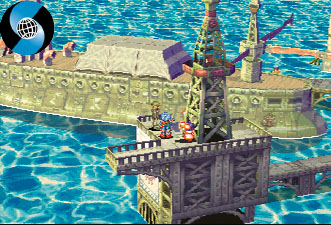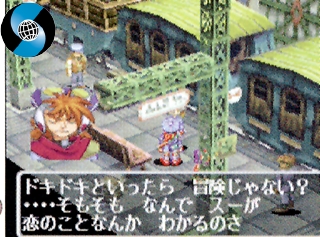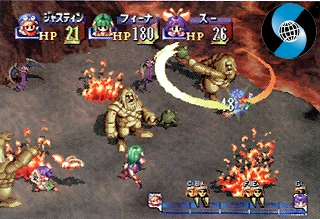 |
Grandia - Retroview |
 |
Wanna be an adventurer?
By: Phillipe Richer
| Review Breakdown |
| Battle System |
6 |
| Interface |
8 |
| Music/Sound |
6 |
| Originality |
5 |
| Plot |
4 |
| Localization |
9 |
| Replay Value |
4 |
| Visuals |
6 |
| Difficulty |
Very, Very Easy |
| Time to Complete |
50-60 hours
|
|
| Overall |
 |
| Criteria
|
First released on the Sega Saturn in 1998, Grandia was looked at as the pride and joy of the doomed system's followers. The game then got re-released on the PlayStation in 1999, reaching out to fans who had never even heard of it. Acclaimed by some gamers as one of the best adventures ever, Grandia follows Game Arts' tradition of light-hearted and quirky RPGs. Depending on your point of view, this may or may not be a good thing.
There's just something about a 10 year-old that plays hide-and-seek all day who goes on to save the world that just doesn't seem right to me. But for those who can look past age (and therefore muscle development) they will embark on a huge quest making friends, exploring further than anyone ever has and getting mixed up in some world destroying business as usual.
Long ago, the Spirits blessed the land using a Spirit Stone which they entrusted to the Icarians. However, peace began to vanish from the humans' hearts and both the Spirits and the Icarians were lost in time. Justin, a small boy from the port town of Parm who dreams of becoming an adventurer, hears a voice telling him to seek the secrets of the Icarians after acquiring a mysterious stone in the Sult Ruins. Get ready for 60 hours of gaming because this is a long one.

|
| Your adventure starts beyond the sea.
|
|
Battles are one of the best aspects of the game, as well as one of the worst. Enemies appear on-screen and once you bump into one a battle begins. Your party of 4 characters will act according to the Initiative Point (IP) gauge, quite similar to the ATB system. Every characters and enemies have their portrait of the IP gauge which moves at a pace dictated by their agility stat. Once your portrait reaches the "Command" point, you may choose whatever action you wish to perform. You must then wait until your portrait reaches the "Action" point where he will charge toward the enemy to attack or stay in place to initiate his command. The speed at which your portrait moves from the COM point to the ACT point depends on the power of the attack chosen and the speed of your character. If you or your enemy attacks someone with a powerful enough attack you can slow down or even cancel someone's progression on the IP gauge (if they're located between the COM and ACT point), meaning that if you time things right you may very well get through a boss battle without getting touched, which is what will happen often.
Among the commands you may choose in battle are the usual magic, item and defend (which you may also use to move your characters on the battlefield) commands. You may select 3 different physical attack methods, namely combo, critical and moves. Combo lets you execute two medium attacks for decent damage while critical is a stronger blow used more often to try and cancel out an enemy's action. Moves are simply special attacks which consume SP every time they are used. Characters can use more than one type of weapon, ranging from swords to bows, and every time you attack in battle with a certain weapon you will gain a little experience for that weapon. Once you reach 100, your character will gain proficiency with that weapon, lending both a boost in stats and the opportunity to gain more potent moves once certain levels are reached.
There are 2 things that make battles in Grandia annoying. One, they are easier than attracting a hobo with a $20 bill! You will barely have to heal at all, and no matter what you do you will have a hard time GETTING hit. If you fight every battle, finishing the game will be a breeze. Two, battles are everywhere! As soon as you finish one you are guaranteed to bump into another enemy. That's why dungeons are long and boring; you fight a million easy-as-pie fights, and once you're done with a dungeon you're rushed into another one. You don't calculate the amount of time you play by hours, you count in dungeons. I could never play more than 2 dungeons in a row. I tried avoiding as many enemies as I could during my second playthrough, but then battles got impossible to win. So in short, battles are everywhere and become boring really fast.
In large part to the DBZ universe's large fan base in North America, localization was not a problem. Any game with the series name on it will do a fair amount of sales, and Infogrames was smart enough not to err on the translation efforts. It was a very smart move on their part.

|
| Don't take the monthly pass, you'll only take it once. |
|
The menus and various controls are well-executed. Rotating the camera, checking up on your spell levels and talking to people are intuitive features that are well-done. Character A.I. has been well-programmed with many different tactics in mind. You may set single characters or your whole party to act according to your whims, be it going all-out with powerful spells or using only support magic to boost your spell levels. You can make good use of those commands to build up your characters while you do something else, or you could leave every battle up to the computer. But, if you don't want to get involved with the battles, an integral part of every game, are you at least left with a decent plot?
No. It's cheesy, it's cutesy, and it's embarrassingly childish. From the moment you hear Justin yell "I wanna be an adventurer!" to the semi love scene between a 10 year old and a 20(?) year old, to the instant the world is saved by a pre-puberty kid nothing seems realistic or intriguing. There are instances where you'll enjoy wandering through towns, sneaking into enemy HQ or climbing a huge wall, but overall Grandia isn't up to par with the more maturely complex and touching RPG now available. Some people may like the disparate tone found in Grandia, but this reviewer strongly thinks that RPGs have evolved beyond the simple adventure quest. It's really a question of opinion, but this kind of plot isn't the reason why I got hooked on RPGs.
Musically it's quite... sleepy. There are some nice tracks such as the opening music and the theme song played slowly with a violin, but it's mostly forgettable. There aren't enough exciting or bold compositions, which makes for an okay-but-no-more soundtrack. The sounds found throughout the game are appropriate, but once again, no more. You'll hear that footstep sound all the time though, and it gets annoying really fast. Grandia also features some voice-acting during the "important" scenes. It's a good effort, and the actors did a fairly good job at keeping things simple and natural. The delay between two sequences can get really long sometimes.
Dialogues are great (one thing I liked). They're casual, fun to read and devoid of typos. The level of writing always stays at an 8th grade level however, which was probably done on purpose to suit the ultra light-hearted atmosphere of the game.

|
| He got HIT?! No way. |
|
With a quest at least 50 hours long, no world map, no random encounters and no character customization (once you acquire enough mana eggs), Grandia practically asks you NOT to replay it again unless you really enjoyed the plot. Since it was one of the first RPGs I got, I did replay it again. That was one of the worst decisions I've made in my gaming "career" (I take myself seriously), although far behind buying and playing Hoshigami. I got so annoyed with all the battles and the uninteresting plot that my appreciation of the game dropped greatly, which is why I'm being such a hard-ass in this review. If you do get to playing it, which I mildly recommend, at least don't play it twice.
While the game was released some time ago, it was first created for the Sega Saturn, a system quite capable of dishing out good graphics. Grandia attains an acceptable level on that part, although the environments and landscapes are grainy and not visually appealing enough to draw you in. The PS2's texture smoothing option fixes parts of the problem, but that doesn't count. Battle effects and animations are fluent enough and pretty good for the most part. The aspect that will treat your eyes the best are the great character portraits shown next to the dialogue boxes. The artwork is great, the facial expressions engaging and the whole thing just breathes out quality. One very annoying thing is the slowdowns. Grandia is littered with them, and you'll often choose a camera angle not for the view but for the lack of slowdowns that accompanies it.
As I've said before, Grandia purely follows the tradition of Game Arts. There isn't anything new or exciting to see and the plot looks more for your sympathy than your admiration. If you can take the annoying amount of battles as well as the cheesy story, then be my guest and play the game for yourself - but don't play it twice. You've been warned.
|










